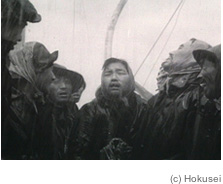The Japan Cultural Institute in Paris:Witness to the History, A Symbol of Today? - "Kanikosen" Revived in France
The Japan Cultural Institute in Paris
 In November 2009, the French translation of Takiji Kobayashi's novel "Kanikosen" (The Factory Ship) was published. This is a story that workers on a crab-fishing and canning ship united to stand up to terrible working conditions and seek human rights. This is one of the most famous proletarian literatures in Japan that denounces the capitalism system through the factory ship. The novel published in 1929 was once again under the spotlight in Japan in 2008 because it appealed to many young readers.
In November 2009, the French translation of Takiji Kobayashi's novel "Kanikosen" (The Factory Ship) was published. This is a story that workers on a crab-fishing and canning ship united to stand up to terrible working conditions and seek human rights. This is one of the most famous proletarian literatures in Japan that denounces the capitalism system through the factory ship. The novel published in 1929 was once again under the spotlight in Japan in 2008 because it appealed to many young readers.
On the occasion of publishing French translation of "The Factory Ship," the Japan Cultural Institute in Paris (Maison de la culture du Japon a Paris: MCJP) hosted a film screening and conference entitled "Takiji Kobayashi's "The Factory Ship": Witness to the History, A Symbol of Today" in January 2010. Our aim was to introduce Japanese proletarian literature to the readers in France where this aspect of the history of Japanese literature had received little attention, and to think about the Japanese society today by reviewing reasons why Japanese people were reading with sympathy a novel written 80 years ago.
 Prior to the conference, a film "The Factory Ship" directed by So Yamamura in 1953 was shown, so that the audience could visualize the contents of the novel. Professor Teru Shimamura of Ferris University pointed out the difference between the film and the novel, as well as the underlying antiwar ideas in 1950. At the following conference, Jean-Jacques Tschudin (Professor Emeritus at the University of Paris Diderot-Paris 7) explained Takiji Kobayashi's life, activity, thought, and literary works. Evelyne Lesigne-Audoly, the translator of "The Factory Ship," depicted that Kobayashi's style of writing, many metaphors, dialects, and onomatopoeias and a story of the collective hero found in the novel were quite difficult to translate into French. The last presenter was Cecile Sakai (Professor at the University of Paris Diderot-Paris 7) who described social and economic backgrounds of Japan today that evoked sympathy with the novel. The young generation who were called "lost generation" or "working poor" saw "The Factory Ship" as a convincing story, because it depicted a situation similar to their own. She also pointed out that there was also the nostalgia for a time when the political commitment made sense.
Prior to the conference, a film "The Factory Ship" directed by So Yamamura in 1953 was shown, so that the audience could visualize the contents of the novel. Professor Teru Shimamura of Ferris University pointed out the difference between the film and the novel, as well as the underlying antiwar ideas in 1950. At the following conference, Jean-Jacques Tschudin (Professor Emeritus at the University of Paris Diderot-Paris 7) explained Takiji Kobayashi's life, activity, thought, and literary works. Evelyne Lesigne-Audoly, the translator of "The Factory Ship," depicted that Kobayashi's style of writing, many metaphors, dialects, and onomatopoeias and a story of the collective hero found in the novel were quite difficult to translate into French. The last presenter was Cecile Sakai (Professor at the University of Paris Diderot-Paris 7) who described social and economic backgrounds of Japan today that evoked sympathy with the novel. The young generation who were called "lost generation" or "working poor" saw "The Factory Ship" as a convincing story, because it depicted a situation similar to their own. She also pointed out that there was also the nostalgia for a time when the political commitment made sense.
On publication of French translation of "The Factory Ship", many book reviews appeared on French media with reference to the book's popularity in Japan. Moreover, an opportunity of seeing a film that was rarely shown in France attracted over 230 visitors, and they responded very favorably.
MCJP is a culture complex with an aim to introduce a variety of Japanese culture both traditional and contemporary to people in France. We were very proud to present a project like this because few other organizations could realize an attempt to discuss multi-layered themes including film, novel, translation, modern and contemporary Japan, and literature and society through one novel.
Related Articles
Back Issues
- 2024.3. 4 Movie Theaters aroun…
- 2023.4.10 The 49th Japan Found…
- 2023.3.28 JF's Initiatives for…
- 2023.1.27 Living Together with…
- 2022.11.16 Inner Diversity <…
- 2022.6.21 The 48th Japan Found…
- 2022.3.22 JF's Initiatives for…
- 2022.3.14 JF's Initiatives for…
- 2022.2.14 JF's Initiatives for…
- 2022.2. 4 JF's Initiatives for…

